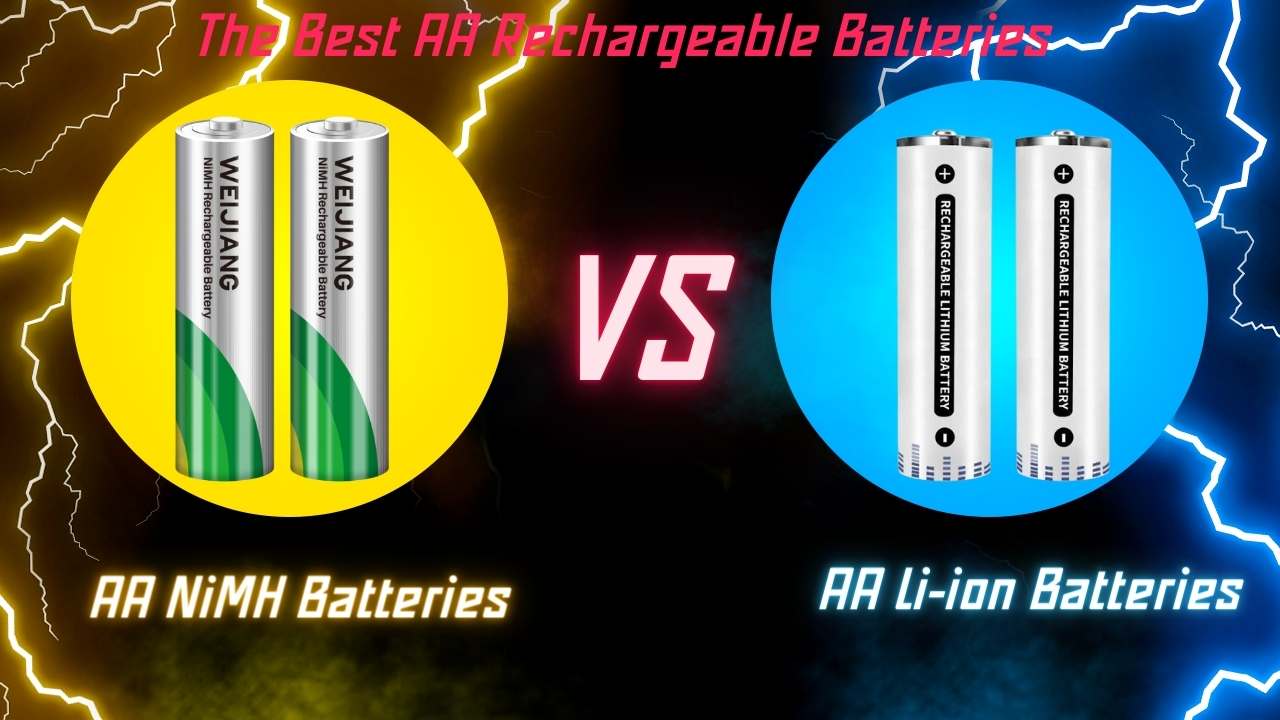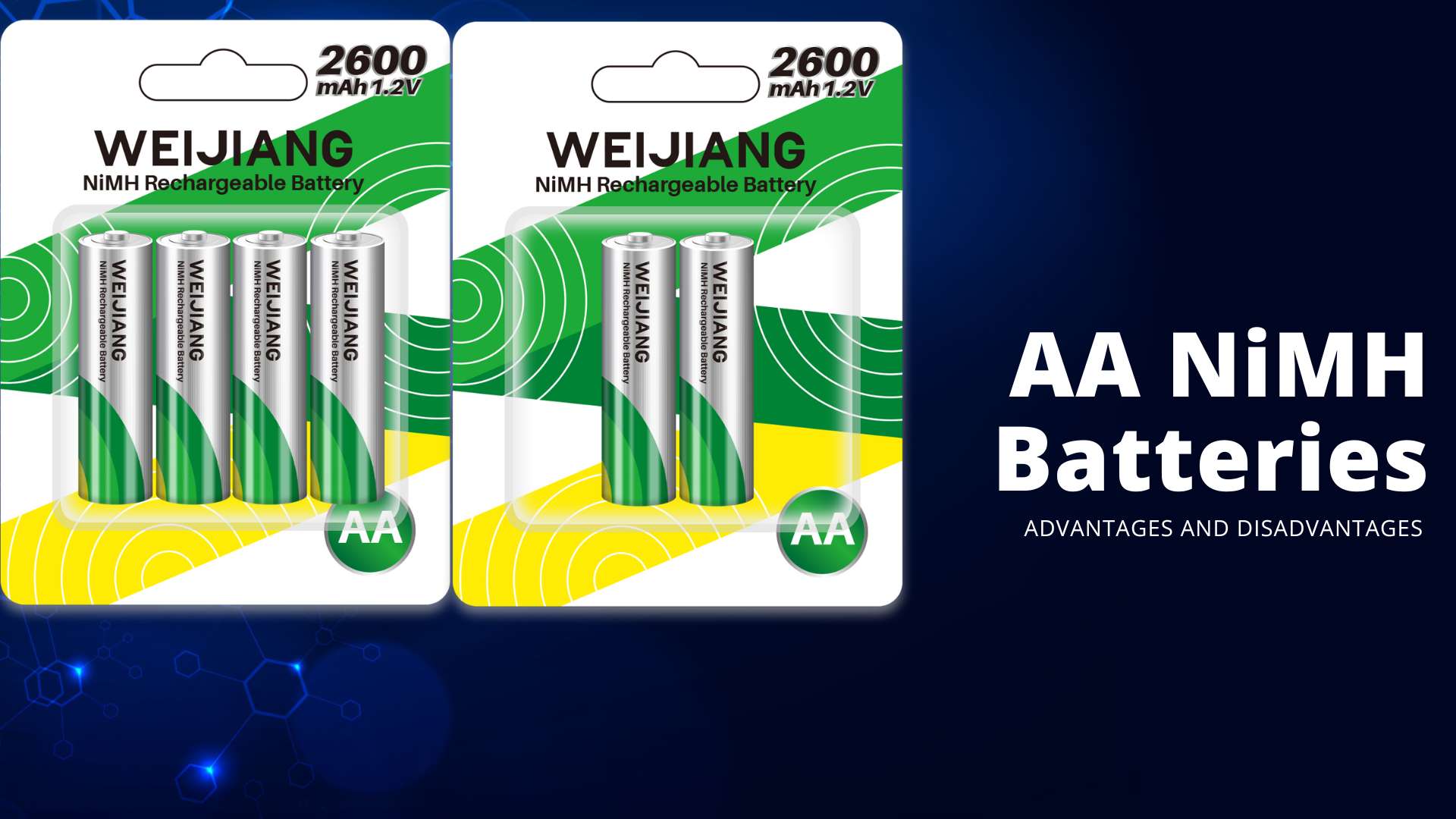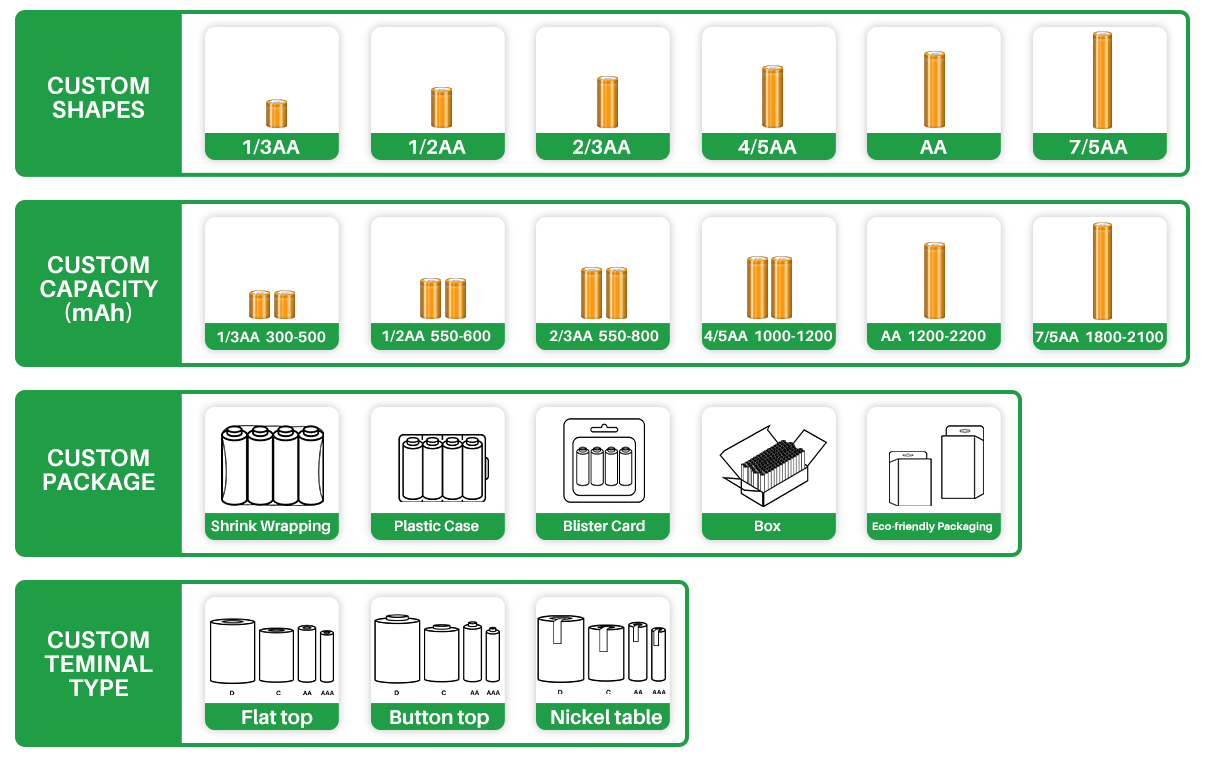
AA rechargeable batteries are a type of battery that can be recharged and reused multiple times. They are commonly used in various electronic devices, such as toys, remote controls, and digital cameras. AA rechargeable batteries typically have a voltage of 1.2 volts, which is slightly lower than the 1.5 volts of a standard non-rechargeable AA battery. However, they can be recharged hundreds or even thousands of times before replacing them, making them a more environmentally friendly and cost-effective alternative to disposable batteries.
AA rechargeable batteries are standard-size rechargeable batteries with a cylindrical shape, a diameter of approximately 14.5 mm (0.57 inches), and a length of approximately 50.5 mm (1.99 inches). This size is standardized by the International Electrotechnical Commission (IEC) and is commonly referred to as "AA" or "double-A" size. It's worth noting that the exact dimensions of AA rechargeable batteries may vary slightly between different manufacturers and battery chemistries. However, these differences are typically minor and do not affect the battery's compatibility with devices designed to use AA batteries.
When choosing AA rechargeable batteries for your business, you may find yourself at a crossroads between AA NiMH (nickel-metal hydride) batteries and AA Li-ion (lithium-ion) batteries. Both battery types have their own unique features, benefits, and drawbacks. As a B2B buyer or purchaser of batteries, it is essential to understand their differences to make an informed decision. This article will explore the advantages and disadvantages of AA NiMH batteries and AA Li-ion batteries.
AA NiMH Batteries: Advantages and Disadvantages

Compared with the Alkaline battery, AA NiMH batteries provide a more powerful, long-lasting, and eco-friendly option than disposable Alkaline batteries. AA NiMH batteries have been popular with many businesses due to their high capacity, long service life, and low self-discharge rate. Let's delve deeper into the advantages and disadvantages of AA NiMH batteries.
Advantages
- ①High capacity: NiMH AA batteries typically have a higher capacity than their alkaline counterparts, providing a longer-lasting power source for your devices.
- ②Long service life: With proper care and usage, NiMH AA batteries can be recharged up to 1,000 times, making them an economical and environmentally friendly option.
- ③Low self-discharge rate: NiMH batteries are lower than older NiCd batteries, meaning they can hold a charge for longer when not in use.
- ④Wide temperature range: NiMH batteries can operate widely, making them suitable for various environments and applications.
Disadvantages
- ①Weight: NiMH AA batteries are generally heavier than Li-ion batteries, which can concern portable devices.
- ②Voltage drop: NiMH batteries may experience a gradual voltage drop during discharge, which can affect the performance of some devices.
- ③Memory effect: Although less pronounced than NiCd batteries, NiMH batteries can still exhibit a memory effect, which may reduce their overall capacity if not managed properly.
As a leading China NiMH battery factory, we are committed to providing our B2B customers with high-quality AA NiMH batteries catering to various applications. Our AA NiMH batteries offer excellent performance, reliability, and value for various industries.
AA Li-ion Batteries: Advantages and Disadvantages
AA Li-ion batteries have gained popularity recently due to their lightweight design, high energy density, and quick charging capabilities. Here are the pros and cons of Li-ion batteries.
Advantages
- ①High energy density: Li-ion batteries have a higher energy density than NiMH batteries, meaning they can store more energy in a smaller, lighter package.
- ②Fast charging: Li-ion batteries can be charged more quickly than NiMH batteries, making them ideal for applications that require frequent recharging.
- ③No memory effect: Li-ion batteries do not exhibit the memory effect, ensuring they maintain their full capacity over time.
- ④Longer shelf life: Li-ion batteries have a longer shelf life than NiMH batteries, allowing them to be stored for extended periods without significant loss of capacity.
Disadvantages
- ①Higher cost: Li-ion batteries tend to be more expensive than NiMH batteries, which may concern businesses on a budget.
- ②Safety concerns: Li-ion batteries can pose safety risks if improperly handled or charged, as they may overheat, catch fire, or even explode.
- ③Limited temperature range: Li-ion batteries have a more limited operating temperature range than NiMH batteries, making them less suitable for extreme conditions.
Which AA Rechargeable Battery is Best for Your Business?
Choosing between AA NiMH batteries and AA Li-ion batteries ultimately depends on your business needs and priorities. AA NiMH batteries may be ideal if you require a high-capacity, long-lasting, and environmentally friendly battery. On the other hand, if you prioritize lightweight design, fast charging, and high energy density, AA Li-ion batteries may be more suitable for your needs.
In conclusion, AA NiMH and Li-ion batteries have advantages and disadvantages. Evaluating your business's requirements is essential to determine the most suitable battery type. AA NiMH batteries are the most common type of AA rechargeable battery and are widely available in stores. On the other hand, AA Li-ion batteries are less common and typically used in higher-end devices that require more power and longer battery life.
If you are looking for a trusted NiMH battery supplier, feel free to contact us to discuss your needs and explore our range of high-quality customized AA NiMH batteries, like 1/3 AA NiMH batteries, 1/2 AA NiMH batteries, 2/3 AA NiMH batteries, 4/5 AA NiMH batteries, and 7/5 AA NiMH batteries.

Post time: Jun-29-2023





